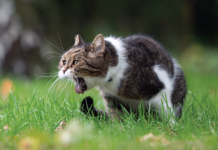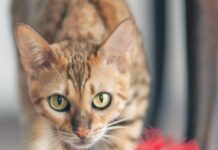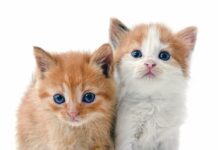Question: My newest cat has gained an alarming amount of weight. She is almost a year old and weighs approximately 12 pounds – a weight that is not appropriate for her body size. She was spayed at about six months of age. I have four other cats and leave dry food out all the time. She seems to display a kind of possessive behavior in that she will run to the dish if she hears or sees one of the other cats eating, and then shell eat some herself. Also, she sometimes tries to block the other cats from getting to the dish. The weight gain and possessive behavior were not evident until three months after spaying. My veterinarian thinks her eating habits are the result of spaying. My other cats do not have a problem with obesity, and Im told that restricting their food intake to accommodate her issue would jeopardize their health. Any thoughts?
Answer: During a lecture on feline obesity, one of my more portly veterinary colleagues leaned over and whispered, You know, Jim, the only people worried about fat cats are skinny vets! I wish that were really the case. There truly are health problems associated with obesity. Obese cats are about four times more likely to develop diabetes mellitus, about five times more likely to become lame, and about twice as likely to be afflicted with certain skin conditions than are their slimmer counterparts. There may be other problems, but these are the only ones we know about so far.
What about spaying?
A cat gains weight because its intake of calories exceeds its bodys requirements – it eats more than it burns off. A compilation of the results of several recent studies suggest a number of ways spaying encourages a gain in weight, including the following:
1. Spaying is associated with a decrease in metabolic rate. On average, neutered cats require about one fourth to one third fewer calories.
2. Spaying affects food intake. In several studies, spayed cats consistently ate more of the food offered than did unspayed cats; the latter appeared more able to self-regulate food consumption. Spaying may disrupt the physiologic mechanisms that inform an animal when its eaten enough (this is true in laboratory rats-and perhaps cats, too).
3. Spaying is associated with a reduction in activity levels. Couch potato cats burn fewer calories.
4. Spaying changes the activity of an enzyme involved in fat storage (lipoprotein lipase). The end result is enhanced body fat storage.
Please dont fail to note that even though spaying is associated with obesity, the benefits of the procedure far, far outweigh any downsides.
Other factors at fault
Some researchers have linked obesity with indoor confinement, reasoning that indoor cats have fewer opportunities to burn calories. Others have found a relationship with the feeding of high-fat, highly palatable dry diets. Still others determined that the continuous provision of food – ad lib or free feeding – promotes obesity, regardless of the diet. For many spayed cats, making food available at all times will just not work because they will overeat.
And then theres the eating behavior of each individual. Frankly some cats are … well, pigs. Take Fang, one of my own kitties. Her food dish is in the kitchen and if anyone enters the room she feels compelled to eat. When her late feline buddy, LT, approached the dish, she always pushed in first. (I personally believe competition for food is a factor in some cases of feline overeating – perhaps in your cats situation.)
Resolution?
On average, a caloric reduction of about 30 percent is required to maintain optimal body condition after spaying or neutering. However, if a cat is spayed while still growing, as most are, there is a danger in markedly restricting food intake, so make sure to follow your veterinarians guidance. You probably should provide only a set amount of food – including any treats – on a daily basis. How much, you might ask? The amount varies from cat to cat, so again consult your veterinarian. If there are several cats in the household, you may need to feed them individually, lest the obesity-inclined snatch someone elses food.



